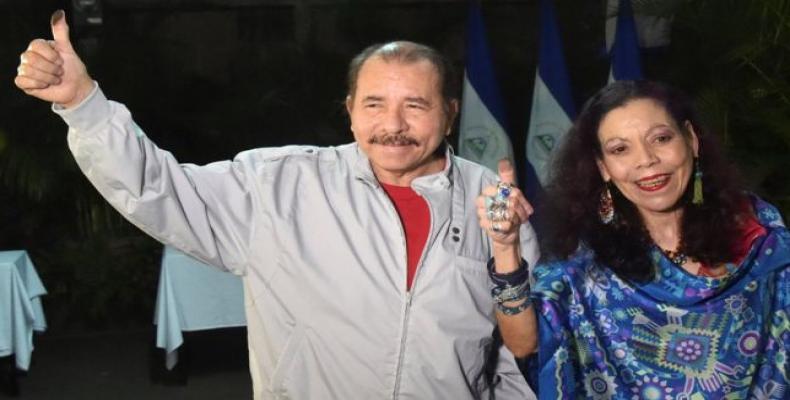Managua, November 7 (RHC)-- Nicaragua's incumbent President Daniel Ortega of the Sandinista National Liberation Front, the FSLN, locked in a win for a third consecutive term in Sunday's election.
The president of the Supreme Electoral Council, Roberto Rivas, said late Sunday that Daniel Ortega had an irreversible lead of more than 72 percent with two-thirds of votes counted. Ortega, who ran with his wife, Rosario Murillo, as his vice presidential candidate, faced five other lesser-known candidates in the election.
Rivas said 65 percent of Nicaragua's 3.8 million registered voters participated in the election. The opposition, which had urged people to boycott the election, disputed that, contending that turnout was low.
Ortega and the ruling Sandinista National Liberation Front have steered Nicaragua into steady economic growth, and the country boasts low levels of violence compared to neighbors like Honduras and El Salvador. Many Nicaraguans also cite the first lady's social programs as a major reason for the governing party's popularity.
Election authorities in Managua announced Monday morning that Ortega's overwhelming support of 72.1 percent of the vote was followed in distant second by Maximino Rodriguez, the candidate of the center-right Liberal Constitutionalist Party and a former right-wing paramilitary fighter, at 14.2 percent.
Despite the fact that polls correctly predicted the outcome of the vote, Nicaragua's opposition rejected the results, calling for new elections. Part of the opposition calling themselves the Broad Front for Democracy even came out against the results before the release of preliminary figures, saying they would not recognize the legitimacy of Sunday's balloting.
While some Sandinista rivals and media have attempted to call the vote into question, Nicaraguan officials and government supporters say this is a political ploy to undermine a government that has the support of the vast majority of the country.
Nicaraguans were called to chose a president, vice-president and members of the National Assembly to govern the Central American country for the next five years. Ortega, the former guerrilla leader of the leftist FSLN, had been polling ahead of his closest rival by over 60 points through most of the campaign.
"He (Ortega) is the only person who has worked for the poor, and he will keep doing it, because that is his essence," 64-year-old retiree Jose Vicente Pong told Reuters while casting his ballot in the capital city Managua Sunday morning. "He comes from poverty, and he'll keep working for the poor."
FSLN supporters began celebrations in the early hours following the preliminary announcements. In a speech after casting his vote, Ortega responded to some of the criticisms of the Nicaraguan electoral process, saying it was a long struggle to establish a process run exclusively by Nicaraguans. “They say we don't have elections here because there is no exchange of hate-filled words,” said Ortega, who highlighted the tranquil nature of the campaign.
This was the seventh time that Ortega stood as candidate for the Sandinista National Liberation Front. The first time was in 1984 when he was elected president and ruled the country for six years before losing the 1990 election. He returned to power in 2007 and was re-elected in 2011.
The electorate also decided on 92 members of the National Assembly and 20 representatives to the Central American Parliament, Parlacen. The FSLN swept the National Assembly with 66.4 percent, while the Liberal Constitutionalist Party took 14.7 percent. The breakdown of seats has not yet been finalized.
Sunday's election featured more than 120 international observers, who according to the electoral authority have “wide” experience. This group includes former presidents and heads of state and even a delegation of the Organization of American States. Invited election observer Santiago Rodríguez, vice president of the Central American Integration System, reported "very good coordination" of the voting process Sunday morning.
According to national police, there were no incidents to report concerning the opening of 14,581 polling stations across the country. Hours after polls opened, authorities reported that election day was running smoothly and without any delays.
However, one serious incident was reported in the town of Nueva Guinea, where a group of approximately 50 armed men broke into a polling location and burned election material.
Daniel Ortega Wins Third Term in Nicaraguan Presidential Elections

Related Articles
Commentaries
MAKE A COMMENT
All fields requiredMore Views
- Adidas president highlights reunion with Cuba
- Cuba and Mongolia exchange on biotechnology in agriculture
- Founder of sport parachuting in Cuba passes away
- UNICEF says over 14,000 children killed in Israel’s genocidal war of aggression against Gaza
- Vegueros de Pinar remains at the top of the National Baseball Series

